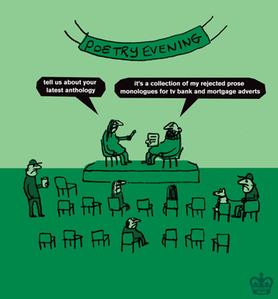The uplift in sales of the poetry sector,
first reported last autumn,
has been attributed to a host of factors,
including increased diversity
among poets
and young people discovering
works
through social media.
 Tuesday was UNESCO's World Poetry Day ("Let's celebrate #poetry's power to shake us from everyday life."). I kept thinking of money. I didn't feel guilty because BookNet Canada's annual sales report, The Canadian Book Market 2016, recently noted that sales of poetry books grew 79% last year, "largely due to the success of Canadian poet Rupi Kaur's debut collection, Milk and Honey." The category had increased 10% in 2015, 8% in 2014 and 5% in 2013, and now accounts for 0.37% of the print book market in Canada.
Tuesday was UNESCO's World Poetry Day ("Let's celebrate #poetry's power to shake us from everyday life."). I kept thinking of money. I didn't feel guilty because BookNet Canada's annual sales report, The Canadian Book Market 2016, recently noted that sales of poetry books grew 79% last year, "largely due to the success of Canadian poet Rupi Kaur's debut collection, Milk and Honey." The category had increased 10% in 2015, 8% in 2014 and 5% in 2013, and now accounts for 0.37% of the print book market in Canada.
Meanwhile, the Bookseller reported this week that 2016 was the best on record for the poetry category through Nielsen, with 1.078 million poetry books selling for £9.9 million [about $12.4 million]. BookScan statistics show that in 2017 sales are already up 16% in volume to 86,664 copies in the first quarter and 10.9% up in value to £787,800.
Susannah Herbert, executive director at the Forward Arts Foundation and National Poetry Day director, noted that eight of the 10 bestselling contemporary poetry books of 2016 authored by a single person were by women, which she said was helping to grow young female audiences.
Money is a kind of poetry
A few years ago in the Financial Times, John Lanchester cited a famous Wallace Stevens line ("money is a kind of poetry") and noted that he'd said this "a number of times to people who work with money, and they always seem to know what Stevens meant--even though it's a hard remark to paraphrase. Money is like poetry because both involve learning to communicate in a compressed language that packs a lot of meaning and consequence into the minimum semantic space. It's also like poetry because there is a kind of beauty in the way money works, at least in the mathematical abstract: an absence of hypocrisy, or redundancy, or floweriness, or of anything that is there purely for its own sake."
On World Poetry Day, I kept seeing money:
In a poem on Twitter from London's West End Lane Books:
the inevitable marketing ploy.
Yes, you guessed,
20% off here ahoy.
In multi-billionaire Richard Branson's "A poem for all entrepreneurs," which he wrote in tribute to his favorite author, Dr. Seuss. It ends:
Make bold moves, but always play fair,
Always say please and thank you--it's cool to care.
Do what you love and love what you do,
This advice is nothing new.
Now, stop worrying about whether your business will be a hit,
Rise to the challenge and say "screw it, let's do it!"
In this "Poetry Evening"cartoon for the Guardian:
 |
|
| Modern Toss/the Guardian | |
And in Vienna-based coffee roaster Julius Meinl 's annual Pay With A Poem promotion "to awaken inner poets across the globe, and ultimately, showcase the power poetry has to increase optimism." In January of this year, Julius Meinl commissioned a study that found:
- Of those that have ever written poetry, the majority (54%) haven't since childhood
- Nearly a fifth of the population believes that poetry is only likely to be written by the well-educated, or members of the 'literati'
- Just one in 10 people think poetry is likely to be written by people other than well-educated literature fans
- 7% of people have never read a poem in their lifetime
Poetry is not a luxury
In her World Poetry Day 2017 message, UNESCO Director-General Irina Bokova said: "Poetry is not a luxury. It lies at the heart of who we are as women and men, living together today, drawing on the heritage of past generations, custodians of the world for our children and grandchildren."
Emma Smith, commissioning editor at Trapeze, told the Bookseller: "Poetry is on the move again: the publishers and booksellers are still obviously vital but--with a few notable exceptions--they have been quite slow to clock how the landscape has changed. If they would just invest in training their poets up in the use of Instagram and YouTube the market would grow even faster."
Michael Schmidt, managing and editorial director of Carcanet Press, observed: "The poetry market is rather erratic just now with some books selling extremely well. The reasons are the same old same old.... Certainly social media contributes to people's (not only young people's) awareness of specific poets and particular events. I don't think poetry as a category is in spate, but certain poets certainly are."
Keep reading. Keep listening. Keep buying. Keep talking. Poetry is a kind of currency ("the fact or quality of being generally accepted or in use").

